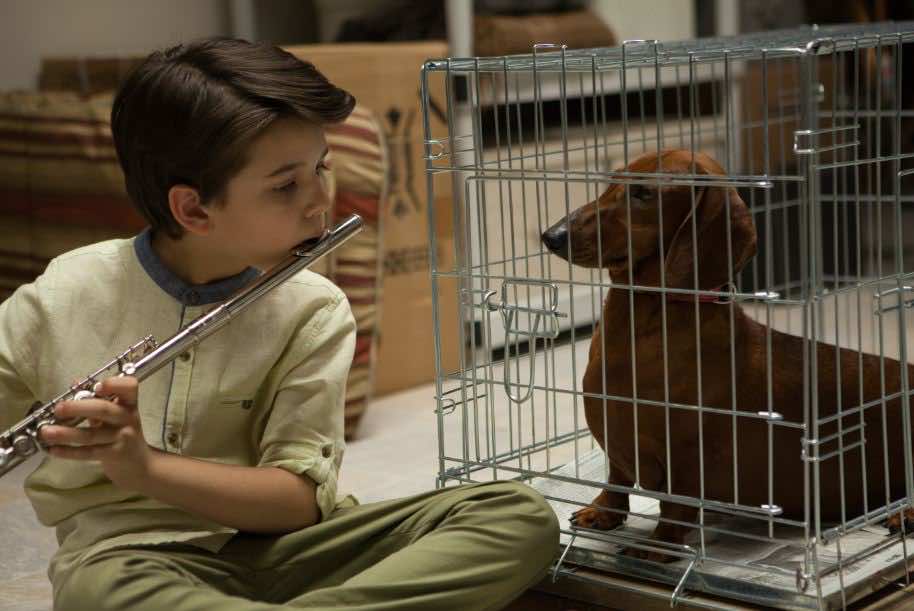
Unlike many indie filmmakers who plied their craft in the 1990s era of uncomfortable humor whose grim laughs came from looking at the darkest parts of humanity, the films of writer-director Todd Solondz have retained a sort of unshakable relevance. Part if it comes from how he continues to follow certain characters, years later. But also, Solondz himself has grown as a filmmaker. He has a special knack to tap into the ineffable with a sometimes murky kind of storytelling that speaks to humbling truths in humanity that can range from embarrassing to terrible and always feel inexpressible in polite company.
That said, his latest is partly a sequel to Welcome to the Dollhouse (1995), and also features a very, very long tracking shot of dog diarrhea along a driveway. Expressively shot, darkly humorous and frighteningly insightful to the futility of life while embracing the charms of love, Wiener-Dog is Solondz in his comfort zone of squirm-inducing confrontation that makes personal human existence awkward, heart-breaking and beautiful. The film follows a single dachshund as it is handed off from owner to owner. Solondz has no interest in how this happens. There’s even an intermission featuring the dog walking through tacky digital backdrops of Monument Valley and a strip club to the sounds of a twangy country song called “The Ballad of Wiener-Dog” by “South Park” composer Marc Shaiman. What matters is that the dog does get around and bears witness to both the ills and charms of humanity.
Like the dark humor that fuels “South Park,” no one is spared in this film. There’s the failed screenwriter and cynical professor Dave Schmerz played with trapped, suffocating pathos by Danny DeVito and the well-intended atheist French mother (Julie Delpy) whose godless perspective rattles her cancer survivor child Remi (Keaton Nigel Cooke) rather than giving him her intended comfort. Besides the faults of the film’s leads, even the smaller roles are send-ups that skewer tropes of the well-intended but out-of-touch. From a privileged white girl wearing an “I Can’t Breath” T-shirt (a reference to this) to a brawny, successful contemporary black artist espousing to be a voice for his oppressed people while dressing up like a tacky femme outcast from a post-apocalyptic ‘80s flick.
The only constant binding these people together is the titular dog. Played by a cadre of different dogs, the pet also has its name changed by the whims of her owners. When his father (Tracy Letts) gifts Remi the dog, the child gleefully christens her “Wiener-dog.” In the film’s final story we meet a cynical old lady who decides to call her “Cancer,” which is also a circle back to the film’s start. Of course, the film’s title is also a reference to Dawn Wiener, a middle school girl those familiar with Solondz’s films first met in Welcome to the Dollhouse. Nicknamed Wiener-Dog, Dawn is now played by Greta Gerwig.
But what really binds all these people is the specter of death. Whether it’s Remi surviving cancer or the wasted failure of Schmerz, whose lessons have become a sort of laughing-stock among students. When a doctor diagnosis Schmerz as being a ticking time bomb and suggests exercise to get healthier, DeVito exhales “I can’t” with such fatalism, you feel his hopeless inability to even save himself. There is also a pair of shots of Remi that seem to reference the child in Boyhood (‘Boyhood’ is Linklater’s masterpiece on youth, existence and humanity) lying in the grass. But instead of a pensive gaze skyward that hints at his potential, Remi looks like he may have died. The film delivers throughout with incredible moments of stark humor that speak to the vast hopelessness of the inevitable.
This kind of sharp-eyed lens into human concerns transcends visuals, but the image is also key to the Solondz aesthetic, from seemingly tasteless wardrobe by Amela Baksic to tidy framing by the marvelous DP Edward Lachman. He has a way of shooting commercial brands, for instance, that reeks of irony. When Dawn considers a can of Pedigree dog food at a gas station, there is something eerie about the Labrador smiling up at her. Even when she and childhood frenemy/crush Brandon (Kieran Culkin) pull up to the Sunoco gas station, Solondz is sure to have the brightly colored banner logo in frame. The high contrast images of what is supposed to be inviting marketing in the face of themes of unfulfilled lives and impending death speaks to the weak threads of distraction that humanity has tried to prescribe itself in the face of the harshness of life.
But these things live alongside the delights of life, as well. Remi shares a blissful moment of tearing up the living room with Wiener-Dog when his parents are away, even if he ends up on the living room rug, staring at the ceiling with glassy eyes. We also meet Dawn in a heroic sacrifice of her career for the sake of this little dog. Not unlike the film reviewed here a couple of days ago (Swiss Army Man balances humor and death for lighthearted existential enlightenment — a film review), there’s something rather funny about this joke called life. It’s never going to be a perfect experience and sometimes all that’s separating one from its chaos is a decision to act, from something as small as being a little kinder or picking up and leaving everything behind.
Wiener-Dog runs 90 minutes and is not rated (there’s mature language and doggies in great peril). It opens this Friday, July 1, in our Miami area at the Cosford Cinema at the University of Miami’s Coral Gables campus and the Miami Beach Cinematheque. On July 8 it comes to Boca Raton at Living Room Theaters. On Saturday, July 9 Solondz will be present to introduce the film at the Miami Beach Cinematheque followed by a Q&A with local film critic Ruben Rosario. For screenings in other parts of the U.S. visit the movie’s official website and jump through the “Watch Now” link. All images courtesy of IFC Films, who also provided a screener link for the purpose of this review.
(Copyright 2016 by Hans Morgenstern. All Rights Reserved. This material may not be published, broadcast, rewritten or redistributed without permission.)












Wow, I’d love to watch this movie. I just finished watching Hachiko, and this is next on my list.
I loved Hachiko! One of Lasse Halstrom’s late-period bests! But be warned, Wiener-Dog is extremely different in tone.
It was a great movie! I have my own wiener, Candy and I really loved the movie. 🙂
Very cool! I know a guy also with such a dog who didn’t like the movie, but it demands a certain kind of humor.